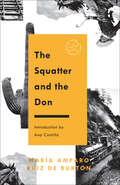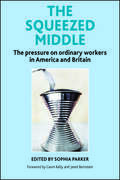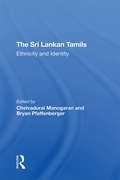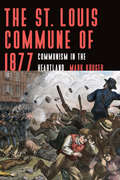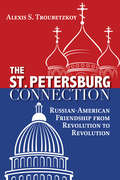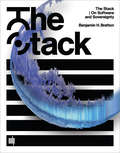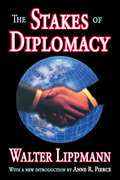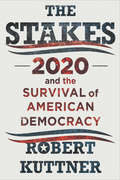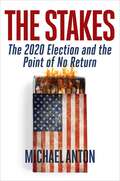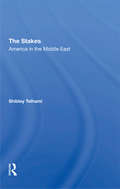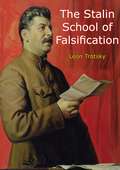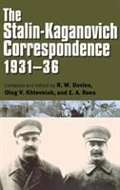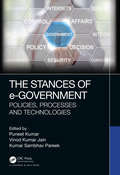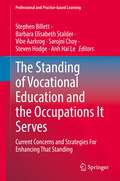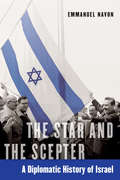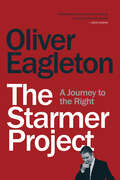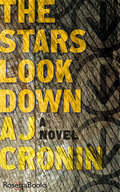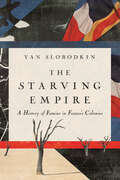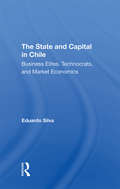- Table View
- List View
The Squatter and the Don (Modern Library Torchbearers)
by Maria Amparo BurtonA historical romance with an activist heart, and an impassioned critique of U.S. expansionism—with an introduction by Ana Castillo, author of So Far from GodA fiercely partisan novel based on the author&’s own experiences, The Squatter and the Don follows two families living near San Diego shortly after the United States&’ annexation of California: the Alamares of the landed Mexican gentry, and the Darrells, the New Englanders who seek to claim the Alamares&’ land. When young Clarence Darrell falls in love with Mercedes Alamar, the stage is set for a conflict that blends the personal with the political. A scathing critique of corporate capitalism, this story exposes the true historical plight of californios as their lands are taken away by a government with incestuous ties to the railroad monopoly—institutions laced with the greed and racism of nineteenth-century America&’s expansionist agenda. The Modern Library Torchbearers series features women who wrote on their own terms, with boldness, creativity, and a spirit of resistance.
The Squeezed Middle: The Pressure on Ordinary Workers in America and Britain
by Sophia ParkerAs wages stagnate but living costs keep rising, the pressure on working people grows more intense. The issue of living standards has become one of the most urgent challenges for politicians in both Britain and America. 'The squeezed middle' brings together experts from both sides of the Atlantic to ask what the UK can learn from the US. American workers have not benefited from growth for an entire generation - the average American worker earned no more in 2009 than in 1975. Now British workers are undergoing a similar experience. No longer can they assume that when the economy grows their wages will grow with it. This collection brings together for the first time leading economic and policy thinkers to analyse the impact of different policies on those on low-to middle incomes and to explain what lessons the UK can learn from America's 'lost generation'. This timely book is essential reading for everyone concerned about the living standards crisis, an issue which could decide elections as well as shaping the future for millions of working families.
The Squire Quartet: Life in the West, Forgotten Life, Remembrance Day, and Somewhere East of Life (The Squire Quartet #1)
by Brian W. AldissFour loosely linked realistic novels from “one of Britain’s most accomplished and versatile writers” (The Guardian). A Hugo and Nebula Award–winning science fiction writer, British novelist Brian W. Aldiss also regularly “returned to earth with distinction,” penning realistic works, including the Squire Quartet (The New York Times). Comprised of “loosely interconnected novels following many characters through a twenty-first century landscape of insidious new technology and international political turmoil” (Booklist), here is the complete series from this “ambitious and gifted writer” (The Guardian). Life in the West: Thomas C. Squire, creator of the hit documentary series Frankenstein Among the Arts, one-time secret agent, and founder of the Society for Popular Aesthetics, is attending an international media symposium in Sicily. It is here that he becomes involved with the lovely but calculating Selina Ajdina. Alongside the drama of the conference is the story of Squire’s private life—the tale of his infidelity, the horrifying circumstances surrounding his father’s death, and the threatened future of his ancestral home in England. “[A] novel of ideas that is also eminently readable . . . a virtuoso performance.” —Publishers Weekly Forgotten Life: Analyst Clement Winters is trying to write a biography of his recently deceased older brother, Joseph. Through the writings Joseph left behind—letters, diaries, notes, and confessions—Clement realizes how vastly his perception of his sibling differs from reality. As Clement tries to make sense of Joseph’s life, he uncovers dark corners of his family history and even his own existence. “A realistic novel . . . imaginative richness . . . [a] many-layered venture into the extraordinariness of ordinary lives.” —The New York Times Remembrance Day: When four people are killed by a terrorist bombing in a small British seaside hotel, an American academic examines the details of the victims’ lives and histories to find the relationship between them and their fate. “Aldiss discovers fresh and arresting nuances in the dichotomy between blind chance and predestination in human affairs . . . original, disturbing, and memorable.” —Kirkus Reviews Somewhere East of Life: Architectural historian Roy Burnell has been tasked with traveling the globe and listing architectural gems in danger of being destroyed. But when Burnell is in Budapest, ten years of his memory, including his sexual experiences, are stolen. In this near future, where thieves sell memories on the black market, Burnell tries to resume his life, while also searching for the “bullet” that will restore his memory. “Intelligent, funny, and hopeful in spite of itself.” —Kirkus Reviews
The Sri Lankan Tamils: Ethnicity And Identity
by Chelvadurai Manogaran Bryan PfaffenbergerWithin the larger context of bitter ethnic strife in Sri Lanka, this timely volume assembles a multidisciplinary group of scholars to explore the central issue of Tamil identity in this South Asian country. Bringing historical, sociological, political, and geographical perspectives to bear on the subject, the contributors analyze various aspects of
The St. Louis Commune of 1877: Communism in the Heartland
by Mark KrugerFollowing the Civil War, large corporations emerged in the United States and became intent on maximizing their power and profits at all costs. Political corruption permeated American society as those corporate entities grew and spread across the country, leaving bribery and exploitation in their wake. This alliance between corporate America and the political class came to a screeching halt during the Great Railroad Strike of 1877, when the U.S. workers in the railroad, mining, canal, and manufacturing industries called a general strike against monopoly capitalism and brought the country to an economic standstill. In The St. Louis Commune of 1877 Mark Kruger tells the riveting story of how workers assumed political control in St. Louis, Missouri. Kruger examines the roots of the St. Louis Commune—focusing on the 1848 German revolution, the Paris Commune, and the First International. Not only was 1877 the first instance of a general strike in U.S. history; it was also the first time workers took control of a major American city and the first time a city was ruled by a communist party.
The St. Petersburg Connection: Russian-American Friendship from Revolution to Revolution
by Alexis S. TroubetzkoyA history of Russian-American relations from 1776 to 1917, when these two states, mostly antagonists since, were warm friends. A compelling account of Russian-American relations from the American Revolution of 1776 to the Bolshevik Revolution in Russia in 1917. Long before the Cold War, there was a seemingly unlikely connection between the two countries — one a champion of liberty and progress; the other an absolute monarchy and defender of tradition. Indeed, following Russia’s refusal to help Great Britain put down the rebellious colonists, there developed a relationship of warm friendship, robust trade, and mutual support between Russia and the newly formed United States of America. Over the course of the next century and a half, the relationship between Russia and America flourished and matured. The St. Petersburg Connection brings to life the events and figures that played a crucial role in that history, drawing a picture of a time when two of the great nations of the last century, often enemies since, were friends.
The Stack: On Software and Sovereignty (Software Studies)
by Benjamin H. BrattonA comprehensive political and design theory of planetary-scale computation proposing that The Stack—an accidental megastructure—is both a technological apparatus and a model for a new geopolitical architecture. What has planetary-scale computation done to our geopolitical realities? It takes different forms at different scales—from energy and mineral sourcing and subterranean cloud infrastructure to urban software and massive universal addressing systems; from interfaces drawn by the augmentation of the hand and eye to users identified by self—quantification and the arrival of legions of sensors, algorithms, and robots. Together, how do these distort and deform modern political geographies and produce new territories in their own image? In The Stack, Benjamin Bratton proposes that these different genres of computation—smart grids, cloud platforms, mobile apps, smart cities, the Internet of Things, automation—can be seen not as so many species evolving on their own, but as forming a coherent whole: an accidental megastructure called The Stack that is both a computational apparatus and a new governing architecture. We are inside The Stack and it is inside of us. In an account that is both theoretical and technical, drawing on political philosophy, architectural theory, and software studies, Bratton explores six layers of The Stack: Earth, Cloud, City, Address, Interface, User. Each is mapped on its own terms and understood as a component within the larger whole built from hard and soft systems intermingling—not only computational forms but also social, human, and physical forces. This model, informed by the logic of the multilayered structure of protocol “stacks,” in which network technologies operate within a modular and vertical order, offers a comprehensive image of our emerging infrastructure and a platform for its ongoing reinvention. The Stack is an interdisciplinary design brief for a new geopolitics that works with and for planetary-scale computation. Interweaving the continental, urban, and perceptual scales, it shows how we can better build, dwell within, communicate with, and govern our worlds.thestack.org
The Stadium: An American History of Politics, Protest, and Play
by Frank Andre GuridyThe "deep and impactful" story of the American stadium (Howard Bryant, author of Full Dissidence)—from the first wooden ballparks to today&’s glass and steel mega-arenas—revealing how it has made, and remade, American life. Stadiums are monuments to recreation, sports, and pleasure. Yet from the earliest ballparks to the present, stadiums have also functioned as public squares. Politicians have used them to cultivate loyalty to the status quo, while activists and athletes have used them for anti-fascist rallies, Black Power demonstrations, feminist protests, and much more. In this book, historian Frank Guridy recounts the contested history of play, protest, and politics in American stadiums. From the beginning, stadiums were political, as elites turned games into celebrations of war, banned women from the press box, and enforced racial segregation. By the 1920s, they also became important sites of protest as activists increasingly occupied the stadium floor to challenge racism, sexism, homophobia, fascism, and more. Following the rise of the corporatized stadium in the 1990s, this complex history was largely forgotten. But today&’s athlete-activists, like Colin Kaepernick and Megan Rapinoe, belong to a powerful tradition in which the stadium is as much an arena of protest as a palace of pleasure. Moving between the field, the press box, and the locker room, this book recovers the hidden history of the stadium and its important role in the struggle for justice in America.
The Stakes of Diplomacy
by Walter LippmannWalter Lippmann is arguably the most influential journalist in American history. From the time of Woodrow Wilson to the time of Lyndon Johnson, what Walter Lippmann said mattered. His word was valued because of his exceptional capacity for analysis, and because he had the rare ability to make complex ideas and problems manageable and understandable. Lippmann combined the practical and the theoretical and saw them as inseparable. He savored the life of the mind and relished the arena of politics. He was political philosopher, social commentator, political advisor, and activist-intellectual. As the country grappled with an impressive influx of European ideas and with the threatening press of European problems, so did Lippmann. Like President Wilson, he came to believe that the condition of the modern world required that America either act or be acted upon. New methods of communication and propaganda meant that ideas contrary to America's would be widely heard. Reformed liberalism and the projection of that liberalism into a troubled world were the best hedge against totalitarian schemes and imperialist aggression. The Stakes of Diplomacy resulted from Lippmann's assignment by Wilson's Secretary of War Baker, to a project for studying possible terms of peace and ways to influence the world in a liberal-democratic direction. The Stakes of Diplomacy ends both with admiration for the peaceful nature of democracies and a plea for their further influence in the world, and with an understanding that democracy's influence will depend partly upon its physical might and geopolitical collaboration. Lippmann stands as a prominent figure in America's twentieth-century quest for power with honor. He concludes this volume with the warning that there is no safe way and no morally feasible way to turn back from our dangerous mission: "Unless the people who are humane and sympathetic, the people who wish to live and let live, are masters of the situation, the world faces an indefinite vista of conquest and terror."
The Stakes: 2020 And The Survival Of American Democracy
by Robert KuttnerTo save both democracy and a decent economy, here’s why it’s crucial that Americans elect a truly progressive president. The 2020 presidential election will determine the very survival of American democracy. To restore popular faith in government—and win the election—Democrats need to nominate and elect an economic progressive. The Stakes explains how the failure of the economy to serve ordinary Americans opened the door to a demagogic president, and how democracy can still be taken back from Donald Trump. Either the United States continues the long slide into the arms of the bankers and corporate interests and the disaffection of working Americans—the course set in the past half century by Republican and Democratic presidents alike—or we elect a progressive Democrat in the mold of FDR. At stake is nothing less than the continued success of the American experiment in liberal democracy. That success is dependent on a fairer distribution of income, wealth, and life changes —and a reduction in the political influence of financial elites over both parties. The decay of democracy and economic fairness began long before Trump. The American republic is in need of a massive overhaul. It will take not just a resounding Democratic victory in 2020 but a progressive victory to pull back from the brink of autocracy. The Stakes demonstrates how a progressive Democrat has a better chance than a centrist of winning the presidency, and how only this outcome can begin the renewal of the economy and our democracy. A passionate book from one of America’s best political analysts, The Stakes is the book to read ahead of the 2020 primaries and general election.
The Stakes: America at the Point of No Return
by Michael AntonTwo months before the 2016 presidential election, an anonymously published essay titled "The Flight 93 Election" rallied conservatives to "charge the cockpit" by voting for Trump. Michael Anton, the author of that controversial viral essay, now says that the last few years have only served to prove his "Flight 93" thesis: the left has become more aggressive, more vindictive, and more dangerous—and the stakes have never been higher. To reframe the upcoming 2020 election, Anton looks at California: a state that has descended from a middle-class paradise into crumbling, crowded chaos under unchallenged Democrat rule. Where California goes, so goes the United States of America, Anton argues—unless conservatives take a stand.
The Stakes: The Consequences of Power and the Choice of Peace
by Telhami ShibleyHow we should have responded to 9-11.
The Stakes: Univ Of Md Edition
by Shibley TelhamiThis book presents an intriguing analysis of American stakes in the Middle East and a thoughtful argument for the compassionate and measured use of force. It explains Arab and Muslim attitudes towards the United States and shows why there is much reason for concern.
The Stalin School of Falsification
by Leon TrotskyBanished from the Soviet Union in 1929, one of Leon Trotsky’s first political tasks was to produce this damning reply to the falsification and re-writing of Bolshevik history carried out by the Soviet Communist Party’s Stalinist leadership. Trotsky’s decisive role in the October Revolution, the Russian Civil War and the first years of Soviet Russia, is exhaustively documented in his ‘Letter to the Bureau of Party History’, which was refused publication in the Soviet Union and forms the main section of this book.Also included is material exposing the fraudulent attempts to re-cast Stalin and his aides as key figures in the Russian Revolution, which involved suppressing and tampering with historical records. Other documents refute Stalin’s spurious theory of ‘Trotskyism’ which, as Trotsky’s evidence proves, was devised solely to discredit the Opposition’s fight for revolutionary Bolshevik principles and justify the Stalinist bureaucracy’s distortion of Leninism.Finally, in this book we have Trotsky’s own indictment of the bureaucracy’s disastrous anti-Leninist policies in action contained in his defence of the Joint Opposition against its expulsion from the Communist Party in 1927.
The Stalin-Kaganovich Correspondence, 1931-1936
by Joseph V. Stalin L. M. Kaganovich R. W. Davies Oleg V. Khlevniuk Liudmila P. Kosheleva E. A. Rees Larisa A. Rogovaya Steven ShabadThe Stalin-Kaganovich correspondence is an important and unique historical source, which no historian engaged in research on Soviet history of the 1930s can ignore. In 1931-36 Stalin entrusted the function of acting as his deputy on party questions to Lazar Moiseyevich Kaganovich, and during the next few years Kaganovich's influence continually increased. Although this post was not authorized by any specific party decision, it was in effect the second most important post in the Central Committee. Kaganovich was in charge of the work both of the Orgburo (Organizational Bureau) of the Central Committee and of several of the most important Central Committee departments, and he managed the sittings of the Politburo during Stalin's absence on vacation and chaired numerous Politburo commissions.
The Stances of e-Government: Policies, Processes and Technologies
by Vinod Kumar Jain Puneet Kumar Kumar Sambhav PareekThis book focuses on the three inevitable facets of e-government, namely policies, processes and technologies. The policies discusses the genesis and revitalization of government policies; processes talks about ongoing e-government practices across developing countries; technology reveals the inclusion of novel technologies.
The Standing of Vocational Education and the Occupations It Serves: Current Concerns and Strategies For Enhancing That Standing (Professional and Practice-based Learning #32)
by Stephen Billett Steven Hodge Sarojni Choy Barbara Elisabeth Stalder Vibe Aarkrog Anh Hai LeThis book addresses what is, perhaps, the single most important issue for vocational education; its relatively low standing in an era of high aspiration. The work explores the nature, extent and consequences for an educational sector that whilst having an increasingly important role in contemporary societies is seen to be of low standing across both countries with developed and developing economies. Some of the standing is associated with the occupation it serves and this is highlighted in an era of high aspiration by young people and their parents. The consequences are far-reaching. This includes how governments and community view and support vocational education, parents and familiars advise about participation in it and young people’s decision-making associated with their post-school pathways. More than describing this problem, the focus of this collection is how this issue can be redressed through the actions of supra-government agencies, governments, schools in tertiary education institutions, industry and professional bodies and employers. It sets out the quality and extent of societal sentiments in shaping how vocational education and the occupation it serves are projected, across countries, continents and cultures, and offers a range of perspectives and contributions from scholars on how this issue might be redressed. These contributions are drawn together and synthesised into sets of propositions, practices and approaches directed towards governments, schooling and tertiary education institutions, educators, researchers, industry and professional bodies and employers. In this way, the book seeks to provide an authoritative, seminal, comprehensive and central text to understand and respond to this central issue for vocational education.
The Star and the Scepter: A Diplomatic History of Israel
by Emmanuel NavonThe first all-encompassing book on Israel&’s foreign policy and the diplomatic history of the Jewish people, The Star and the Scepter retraces and explains the interactions of Jews with other nations from the ancient kingdoms of Israel to modernity. Starting with the Hebrew Bible, Emmanuel Navon argues that one cannot grasp Israel&’s interactions with the world without understanding how Judaism&’s founding document has shaped the Jewish psyche. He sheds light on the people of Israel&’s foreign policy through the ages: the ancient kingdoms of Israel, Jewish diasporas in Europe from the Middle Ages to the emancipation, the emerging nineteenth-century Zionist movement, and Zionist diplomacy following World War I and surrounding World War II. Navon elucidates Israel&’s foreign policy from the birth of the state in 1948 to our days: the dilemmas and choices at the beginning of the Cold War; Israel&’s attempts to establish periphery alliances; the Arab-Israeli conflict; Israel&’s relations with Europe, the United States, Russia, Asia, Africa, Latin America, the United Nations, and the Jewish diasporas; and how twenty-first-century energy geopolitics is transforming Israel&’s foreign relations today. Navon&’s analysis is rooted in two central ideas, represented by the Star of David (faith) and the scepter (political power). First, he contends that the interactions of Jews with the world have always been best served by combining faith with pragmatism. Second, Navon shows how the state of Israel owes its diplomatic achievements to national assertiveness and hard power—not only military strength but economic prowess and technological innovation. Demonstrating that diplomacy is a balancing act between ideals and realpolitik, The Star and the Scepter draws aspirational and pragmatic lessons from Israel&’s exceptional diplomatic history.
The Star and the Stripes: A History of the Foreign Policies of American Jews
by Michael N. BarnettHow do American Jews envision their role in the world? Are they tribal—a people whose obligations extend solely to their own? Or are they prophetic—a light unto nations, working to repair the world? The Star and the Stripes is an original, provocative interpretation of the effects of these worldviews on the foreign policy beliefs of American Jews since the nineteenth century. Michael Barnett argues that it all begins with the political identity of American Jews. As Jews, they are committed to their people's survival. As Americans, they identify with, and believe their survival depends on, the American principles of liberalism, religious freedom, and pluralism. This identity and search for inclusion form a political theology of prophetic Judaism that emphasizes the historic mission of Jews to help create a world of peace and justice. The political theology of prophetic Judaism accounts for two enduring features of the foreign policy beliefs of American Jews. They exhibit a cosmopolitan sensibility, advocating on behalf of human rights, humanitarianism, and international law and organizations. They also are suspicious of nationalism—including their own. Contrary to the conventional wisdom that American Jews are natural-born Jewish nationalists, Barnett charts a long history of ambivalence; this ambivalence connects their early rejection of Zionism with the current debate regarding their attachment to Israel. And, Barnett contends, this growing ambivalence also explains the rising popularity of humanitarian and social justice movements among American Jews. Rooted in the understanding of how history shapes a political community's sense of the world, The Star and the Stripes is a bold reading of the past, present, and possible future foreign policies of American Jews.
The Stark Beauty of Last Things: A Novel
by Céline KeatingThe Stark Beauty of Last Things is set in Montauk, the far reaches of the famed Hamptons, an area under looming threat from a warming climate and overdevelopment. Now outsider Clancy, a thirty-six-year-old claims adjuster scarred by his orphan childhood, has inherited an unexpected legacy: the power to decide the fate of Montauk&’s last parcel of undeveloped land.Everyone in town has a stake in the outcome, among them Julienne, an environmentalist and painter fighting to save the landscape that inspires her art; Theresa, a bartender whose trailer park home is jeopardized by coastal erosion; and Molly and Billy, who are struggling to hold onto their property against pressure to sell. When a forest fire breaks out, Clancy comes under suspicion for arson, complicating his efforts to navigate competing agendas for the best uses of the land and to find the healing and home he has always longed for.Told from multiple points of view, The Stark Beauty of Last Things explores our connection to nature—and what we stand to lose when that connection is severed.
The Starmer Project: A Journey to the Right
by Oliver EagletonForensic political biography of the Labour Party leaderHailed as a human-rights champion and political outsider, what sort of politician is Keir Starmer really, and what mark is he making on the new politics of Labour? In The Starmer Project, Oliver Eagleton provides a careful reading of Starmer&’s record at the Crown Prosecution Service and as a member of Jeremy Corbyn&’s shadow cabinet, tracing the political alliances he forged and the roots of his bid for the party leadership. Starmer originally pledged to revitalise Corbynism with a dose of lawyerly competence. To understand what happened afterwards it is necessary to understand the man himself. So little remains known about Starmer that his actions are usually interpreted as overtures to others. On closer inspection, however, he is anything but an empty political vessel.
The Stars Look Down: A Novel
by AJ CroninThis thought-provoking novel of the challenges a coal mining community faces in the early twentieth century is &“the finest work Cronin has given his public&” (Kirkus Reviews). First published in 1935, The Stars Look Down tells the story of a North Country mining town as its inhabitants make their way through social and political upheaval. Digging into workers&’ rights, social change, and the relationship between labor and capitalism, the struggles of the novel&’s trifecta of protagonists—politically minded miner David Fenwick, ambitious drifter Joe Gowlan, and frustrated yet meek mining-baron&’s son Arthur Barras—remain compelling and relevant to readers in the twenty-first century. AJ Cronin&’s tale is one of many of the hardships of coal-mining communities during the industrial pre-war, World War I, and interwar periods in Britain, but stands out for its unflinching prose, universal themes, and keen storytelling. The novel was adapted into a 1940 film starring Michael Redgrave as Davey Fenwick, is a New York Times Critics&’ Pick, and is included in the New York Times Guide to the Best 1,000 Movies Ever Made.
The Starving Empire: A History of Famine in France's Colonies
by Yan SlobodkinThe Starving Empire traces the history of famine in the modern French Empire, showing that hunger is intensely local and sweepingly global, shaped by regional contexts and the transnational interplay of ideas and policies all at once. By integrating food crises in Algeria, West and Equatorial Africa, and Vietnam into a broader story of imperial and transnational care, Yan Slobodkin reveals how the French colonial state and an emerging international community took increasing responsibility for subsistence, but ultimately failed to fulfill this responsibility. Europeans once dismissed colonial famines as acts of god, misfortunes of nature, and the inevitable consequences of backward races living in harsh environments. But as Slobodkin recounts, drawing on archival research from four continents, the twentieth century saw transformations in nutrition, scientific racism, and international humanitarianism that profoundly altered ideas of what colonialism could accomplish. A new confidence in the ability to mitigate hunger, coupled with new norms of moral responsibility, marked a turning point in the French Empire's relationship to colonial subjects—and to nature itself. Increasingly sophisticated understandings of famine as a technical problem subject to state control saddled France with untenable obligations. The Starving Empire not only illustrates how the painful history of colonial famine remains with us in our current understandings of public health, state sovereignty, and international aid, but also seeks to return food—this most basic of human needs—to its central place in the formation of modern political obligation and humanitarian ethics.
The Stasi Files Unveiled: Guilt and Compliance in a Unified Germany
by Barbara MillerIn 1992 the massive files of East Germany's infamous Ministry for State Security, the Stasi, were made publicly available and thousands of former East Germans began to confront their contents. Finally it was possible for ordinary citizens to ascertain who had worked for the Stasi, either on a full-time basis or as an "unofficial employee," the Stasi's term for an informer. The revelations from these documents sparked feuds old and new among a population already struggling through enormous social and political upheaval. Drawing upon the Stasi files and upon interviews with one-time informers, this book examines the impact of the Stasi legacy in united Germany.Barbara Miller examines such aspects of the informer's experience as: the recruitment procedure; daily life and work; motivation and justification. She goes on to consider the dealings of politicians and the courts with the Stasi and its employees. Her analysis then turns to the way in which this aspect of recent German history has been remembered, and the phenomenal impact of the opening of the files on such perceptions of the past.The Stasi Files Unveiled: Guilt and Compliance in a Unified Germany offers important new perspectives on the nature of individual and collective memory and is a fascinating investigation of modern German society.Barbara Miller graduated from the University of Glasgow in 1991 with a degree in German and psychology. She taught and researched in Germany and Austria before completing her doctoral thesis in Glasgow in 1997. She is now based in Sydney, Australia.
The State And Capital In Chile: Business Elites, Technocrats, And Market Economics
by Eduardo SilvaChile emerged from military rule in the 1990s as a leader of free market economic reform and democratic stability, and other countries now look to it for lessons in policy design, sequencing, and timing. Explanations for economic change in Chile generally focus on strong authoritarianism under General Augusto Pinochet and the insulation of policymakers from the influence of social groups, especially business and landowners. In this book Eduardo Silva argues that such a view underplays the role of entrepreneurs and landowners in Chile's neoliberal transformation and, hence, their potential effect on economic reform elsewhere. He shows how shifting coalitions of businesspeople and landowners with varying power resources influenced policy formulation and affected policy outcomes. He then examines the consequences of coalitional shifts for Chile's transition to democracy, arguing that the absence of a multiclass opposition that included captialists facilitated a political transition based on the authoritarian constitution of 1980 and inhibited its alternative. This situation helped to define the current style of consensual politics that, with respect to the question of social equity, has deepened a neoliberal model of welfare statism, rather than advanced a social democratic one.
